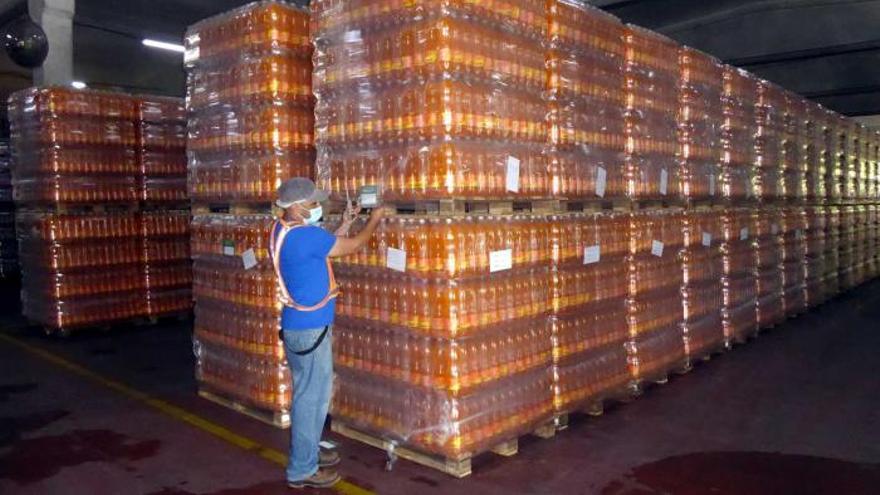
![]() 14ymedio, Madrid, 21 January 2022 — As Cuba’s domestic soft drink manufacturing declined, the shelves of stores that only take payment in freely convertible currency (MLC) were stocked with similar but imported beverages. The complaint comes from the director of the mixed-ownership company — with a foreign partner — located in Pinar del Río Los Portales, Mario Venero Bencomo, who explains to the official press why the national product is scarce while she strives to convince of the importance of betting on the native industry.
14ymedio, Madrid, 21 January 2022 — As Cuba’s domestic soft drink manufacturing declined, the shelves of stores that only take payment in freely convertible currency (MLC) were stocked with similar but imported beverages. The complaint comes from the director of the mixed-ownership company — with a foreign partner — located in Pinar del Río Los Portales, Mario Venero Bencomo, who explains to the official press why the national product is scarce while she strives to convince of the importance of betting on the native industry.
The director reviews the decline in the production of cans and bottles, key in the shortage of Ciego Montero beverages (Tukola, Diet Tukola, Naranja, Soda, Pineapple, Mate) and the Cimex corporation (TropiCola, Cachito, Najita, Ironbeer ), which are produced exclusively at their plant. Los Portales is responsible for the manufacture of containers for 90% of national beverages, but the total number of units has suffered a resounding collapse.
In 2018, with renewed machinery, they achieved a record of 278 million units, a figure that they thought they would exceed each year. But in 2019, with the fuel crisis, which Cuban president Miguel Díaz-Canel called “temporary,” production fell to 247.9 million. In 2020 covid-19 arrived and with it, everything got worse. That year barely 112 million units were manufactured, not even half of the previous year. And this last one, 2021, a tiny 86 million.
The project to double the line of plastic bottles, in the making in 2018, foundered sine die.
More figures for the disaster: of canned soft drinks, only 23.5 million units were produced in 2021, which under normal conditions would hardly take a month and a half of work.
Los Portales is the result of an association with the Swiss brand Nestlé, arranged at at the end of the last century. In 1999, its first year of work, it managed to produce 12 million units, and by 2009 it was already making 48 million soda bottles and 153 million cans.
The factory, predictably due to its mixed-ownership category, can boast of having been well equipped technologically. So much so, that Venero Bencomo assures that there is not a single team left from the first factory, reopened from a pre-existing industry. Few Cuban companies renew their technology in an integral way and so that they no longer depend on obsolete machinery from the Soviet era.
However, the director resorts to the embargo to explain some problems encountered over time, a situation that she describes as “harassment” by the United States. As she explains, some companies have canceled contracts or refused to supply spare parts which forced them to abandon the use of necessary machines.
At this very moment, she maintains, there are no parts for the can capper because the supplier company has sold shares to a US firm, now preventing the sale.
Venero Bencomo attributes the drop in production to the shortage of raw materials, most of which are imported. The purchase of aluminum cans and lids, which is “where the most is spent in this factory, from the point of view of annual consumption,” has been weighed down by the serious economic crisis that afflicts Cuba.
Los Portales has solved part of the problem by boosting the line of plastic bottles, which reached 62.6 million units in 2021, not far from the 68 million that is the norm in the industry, he says.
On the other hand, the production of cans was disastrous, with barely 10.6% of the 220 million able to be made.
Venero Bencomo defends her company and assures that it is exemplary, since it has not increased its prices with the Ordering Task* nor has it fired its workers – whose salary exceeds the country’s average several times, in her words – despite the collapse of the industry. “It is better to produce in Cuba. Employment and development are generated, and dependency on foreign suppliers is avoided,” she argues.
To understand how Los Portales holds up in this context, you have to read to the end of the text. The company has chosen to sell to stores that only take payment in hard currency (MLC), tourism and online in order to capture foreign currency and be able to pay its commitments.
By 2022, the production of some 50 million canned soft drinks is expected, more than double what was achieved in 2021. Although it remains to be seen if it is possible to achieve the goal.
Despite the high production, before the 2018 record, the shortage of these products was noted. Already by 2017 the factory explained that it could not cope because consumption was very high. And all this despite the health problems associated with the sugariness of these drinks.
*Translator’s note: Tarea ordenamiento = the [so-called] ‘Ordering Task’ which is a collection of measures that includes eliminating the Cuban Convertible Peso (CUC), leaving the Cuban peso as the only national currency, raising prices, raising salaries (but not as much as prices), opening stores that take payment only in hard currency which must be in the form of specially issued pre-paid debit cards, and others.
____________
COLLABORATE WITH OUR WORK: The 14ymedio team is committed to practicing serious journalism that reflects Cuba’s reality in all its depth. Thank you for joining us on this long journey. We invite you to continue supporting us by becoming a member of 14ymedio now. Together we can continue transforming journalism in Cuba.
